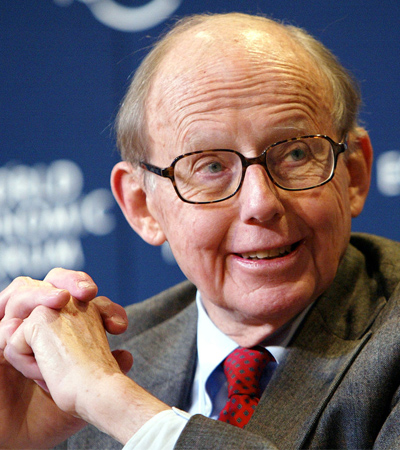
Biography
Samuel Phillips Huntington (1927–2008) was the Albert J. Weatherhead Professor in the Harvard Department of Government and one of the twentieth century’s most influential and controversial political scientists. The bulk of Huntington’s career was spent teaching and writing at Harvard, interspersed with forays into national, state and local politics.
Huntington wrote or edited seventeen books and produced close to one hundred scholarly articles. He is among the most frequently-cited social scientists of the past century and made significant contributions in the fields of civil-military relations, modernization and democratization theory, American political thought, and international relations. Huntington frequently declared that he and the Harvard Center for International Affairs where he worked were devoted to “policy-relevant basic research.” His work was never value-neutral, and he professed himself an intellectual follower of the Protestant theologian Reinhold Niebuhr. According to the political commentator Robert D. Kaplan, Huntington represented “a dying breed: someone who combines liberal ideals with a deeply conservative understanding of history and foreign policy.” His many students include Francis Fukuyama, Eliot Cohen, Fareed Zakaria, and others now prominent in the academy and politics.
Born in New York City to a middle-class Episcopalian family of writers, Huntington graduated from Stuyvesant High School at age sixteen and went on to complete his B.A. at Yale University “with exceptional distinction” in two and a half years. After serving briefly in the U.S. military, he completed his M.A. at the University of Chicago. He then moved to Harvard University, where, at age 23, a year before submitting his doctorate, he was appointed a junior member of the faculty in the Department of Government. In 1951 he completed his doctoral thesis on the subject of the Interstate Commerce Commission.
A lifelong Democrat, Huntington worked in the 1950s as a speechwriter for Democratic presidential candidate Adlai Stevenson. He met his wife, Nancy, during Stevenson’s 1956 presidential campaign and married her the following year. Huntington’s first book, The Soldier and the State, also appeared in 1957 and treated the subject of civil-military relations. This work has since become a classic in the field. Huntington taught at Columbia University from 1958 to 1962, and in 1963 returned to Harvard, where he remained until his retirement in 2007.
During the 1960s Huntington served as a foreign-policy advisor to Vice-President Hubert Humphrey. In 1967, as a State Department consultant, he produced a hundred-page classified report on the Vietnam War, which was declassified in 1968 and reworked as an article in Foreign Affairs. The State Department report anticipated Huntington’s second major work, also published in 1968, Political Order in Changing Societies. It questioned the U.S. policy of promoting rural development in Vietnam, instead blaming “the absence of an effective structure of authority” for Viet Cong gains. As a result of these opinions and political associations, Huntington came to be reviled by the 1960s radical left, leading to campus demonstrations against him. His home was vandalized with the words, “War Criminal Lives Here,” and the Center for International Affairs where he taught was firebombed.
Huntington remained intermittently active in state and local politics, working for both Edward Kennedy and Boston mayor and presidential hopeful Kevin White. In 1970 he co-founded Foreign Policy magazine. From 1977 to 1978, he served as coordinator of security planning for the National Security Council under President Jimmy Carter. Huntington served for over a decade as an advisor to the Brazilian military regime on the problems of liberalization, and a paper he delivered to the South African Political Science Association in 1981 is often cited as the basis of the policy of reforms and security crackdowns instituted by the government of P.W. Botha, although Huntington was subsequently critical of the South African government. He was twice nominated for and denied membership in the National Academy of Sciences, in 1985 and 1986. During this controversy, Yale mathematician Serge Lang led a campaign accusing Huntington of employing “pseudo-math” in his work Political Order in Changing Societies; many political scientists came to his defense, as did University of Pittsburgh computer scientist, Herbert Simon. He served as president of the American Political Science Association from 1986 to 1987.
Huntington’s The Clash of Civilizations (1996), which drew on his 1993 article with the same title, argued that “the great divisions among humankind and the dominating source of conflict [in the coming generations] will be cultural.” The book was subsequently translated into 39 languages and provoked continuing worldwide debate.
Huntington passed away in 2008 at the age of 81 in Martha’s Vineyard, Massachusetts. Before his death, he expressed the hope that he would be remembered for his patriotism and faith. Obituaries appeared in major newspapers around the world.
